Even Woodrow Wilson? The "Purge Moment" Runs Amok
Over the summer of 2015, the argument over displaying the Confederate flag in public grounds galvanized public opinion. Many conservative Southern Republicans agreed that such displays contradict our basic principles and publicly endorse bigotry. Even South Carolina, birthplace of secession, relented on the Confederate flag.
That argument swiftly metastasized into a full-throated uproar over public statues and place names that honor people whose earlier prejudices ill suit our self-image as nation that blends many peoples together. Even the New York Times, the official explainer of our lives, has christened this year a “purge moment,” one when Americans have begun to rummage through their psycho-historical closet and toss out their emotional bell-bottom trousers and other squirmy artifacts of earlier eras.
Among the historical figures being frog-marched to the cultural guillotine are:
- Nathan Bedford Forrest: A feared Confederate cavalry commander, this Tennessean grew rich as a slave broker before the Civil War, became notorious when his troops massacred surrendering black Union Army soldiers at Fort Pillow, and went on to found the Ku Klux Klan. A trifecta of evil.
- William L. Saunders: A Confederate Army officer and later KKK official who served as North Carolina’s Secretary of State.
- Jefferson Davis: The only president of the secessionist Confederate States of America, though he also was a West Point graduate who served in the U.S. Army, as a United States Senator, and as Secretary of War.
Tearing these men’s names off buildings and mothballing their statues doesn’t faze me. People who rebel against the government and lose shouldn’t expect a lot of official tributes from that government. Only the regional quality of our Civil War allowed these Confederates to get statues and public buildings named after them in the first place.
Moreover, public obloquy is the fate not only of losers, but also of those viewed as oppressors or as holding odious views. One of the first acts of America’s revolutionaries – in July 1776 – was to tear down the statue of King George III in New York City.
Recall the glee with which many Americans watched the toppling of statues of Lenin and Stalin when the Soviet Union imploded in 1989, or the removal of Saddam Hussein statues in Iraq in 2003.
But this movement seems to be gaining steam, notably with President Obama’s decision to strike President William McKinley’s name from the tallest mountain in North America and restore the Indian name, Mount Denali. The decision had little to do with any sin of McKinley’s; rather, it was motivated by the wish to recognize Native American heritage. OK, pretty tough on McKinley, but at least no one’s calling him a monster.
Then this movement – most visibly in the Pacific Northwest – expanded to the demand to strip President Woodrow Wilson’s name off schools and other buildings on the ground that he was a bigot and racist. Whoa. Now this feels like we’re running off the rails.
My initial reaction was admittedly self-interested. I have a novel coming out in late September titled The Wilson Deception (available for pre-orders now!), which set at the Paris Peace Conference of 1919. The 28th president is a major character in the story. It seems unpropitious, at best, to launch the book at a time when Wilson’s name is under assault around the country. But there’s more to think about here.
A Man of his Time, Unfortunately
Wilson was a man of the South and and of his time, which meant he held substantial race prejudice. In fact, it’s featured in The Wilson Deception. As a historian, Wilson insisted that Southern slaves before the Civil War were largely well cared for and happy. As president, Wilson took steps to segregate the federal work force and reduce the number of African-American public employees. All hateful.
But as president he also initiated remarkable achievements. His first term in office brought the Federal Reserve banking system, the Federal Trade Commission, and tougher antitrust laws. Although he opposed entering into World War I, he reversed himself after Germany’s declaration of unrestricted submarine warfare and its benighted attempt to stir a Mexican invasion of the United States.
When the Allies’ battlefield success forced Germany to sign an Armistice — yes, he won the war — Wilson inspired the entire world with his idealistic appeals to self-determination of peoples and his “Fourteen Points” for a peaceful postwar world. All of Wilson’s grandiosity and piety crashed around his ears when the United States refused to sign the gravely flawed Treaty of Versailles or to join his favored notion of an international League of Nations. But Wilson’s rhetoric and idealism still frame much international relations a century later.
Did Wilson bequeath a mixed public legacy? You bet. He was in many ways a tragic figure. In others, a limited one. But it’s a dramatic over-reaction to start scrubbing his name off public buildings. We’ve had more than a few national leaders with less-than-enlightened views about race, though those views were entirely consistent with those of their contemporaries.
Let He Who Is Without Sin . . .
George Washington, after all, was a major slaveholder who insisted that his slave work force had to be disciplined, which meant the whip. Should we take his name off Washington, DC? How about the state of Washington?
Thomas Jefferson. James Madison. James Monroe. Andrew Jackson. Slaveholders every one. At least Jefferson and Madison felt guilty about it, but that didn’t do much for their slaves. None lifted a finger to change slaveholding in America. Shall we change the names of three state capitals (Jackson MI, Madison WI, Jefferson City MO), plus the twenty-eight towns and eighteen counties named for Monroe?
No, I don’t think so, either. Not all of history is glorious, not even all of our history. Attitudes change, sometimes for the better. Those who rebelled and lost, those who espoused hate without any other worthy achievements — fine, a la guillotine! But let’s use some judgment, draw some distinctions.
Then along comes the University of Texas. They have just removed statues of Jefferson Davis and — oh, no! — Woodrow Wilson. I am flummoxed. Wilson was the president of the UNITED STATES; Davis was president of the CONFEDERATE STATES. Can’t they tell the difference? Is it that they’ve been reading those twisted history textbooks they use down there? It’s time to sit down a breathe deeply.
Which leads to another question: Where should we put those statues of the disfavored?
On this question, I can help. We should put all the verboten statues in a Theme Park of the Evil Ones and charge admission. Don’t laugh. In 2008, I went to just such a place on the outskirts of Budapest, Hungary, where they have stashed all the Lenin, Stalin, and brawny-socialist-worker statues of the Communist era. It was great! Add some deep-fried Twinkies and you’ve got some serious economic development.
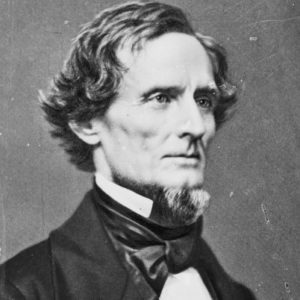
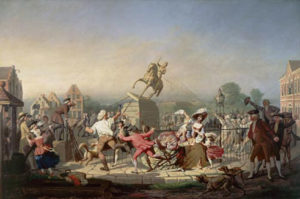
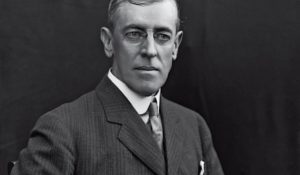
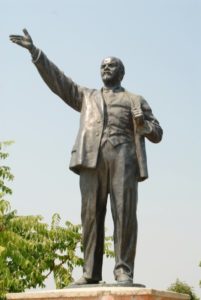
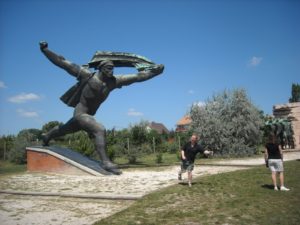
Conflating Woodrow Wilson with Jefferson Davis is an abominable mistake and I am shocked that an institution of higher learning cannot tell the difference. Wilson is to be abhorred because he was a racist is obviously a mistake in reasoning. But I am struggling with this “man of his times” notion. When do those times end? Does it have something to do with the number of people who share those bigoted and racist beliefs? Would we call Donald Trump a racist or a man of his times? Is it bigoted to say that Islam is inconsistent with the values and principles of the United States? Is it bigoted to say that a Muslim should not be allowed to run for president? Are all these people who say such things racists and bigots or simply the product of their times?
I think young people, and the institutions of higher learning that they attend, are having trouble with this “man of his times” concept because so few are calling out the bigots and racist of our current times. It seems like the fear, misunderstanding, negative propaganda and the resulting hatred and disgust that fueled the bigotry and racism of the past is still very much alive and well today and tolerated across a wide swath of the population. Instead of looking into the face of that fear and calling out modern bigots and racists it is easier for the University of Texas to simply remove the statue of a truly great president like Wilson and ignore all the good that he did and tried to do. Could Franklin Roosevelt be next?